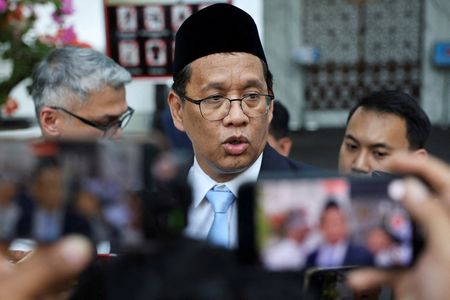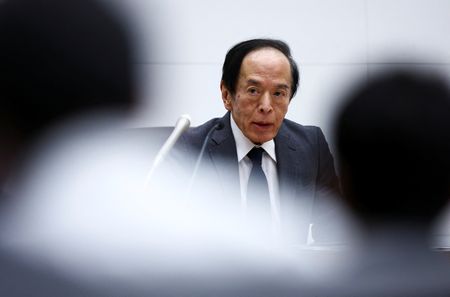By Stefanno Sulaiman
JAKARTA (Reuters) – Indonesia’s Finance Minister Purbaya Yudhi Sadewa said on Friday he saw no need to change the rules on the fiscal deficit ceiling, adding that the Southeast Asian country was in better fiscal health than some other countries.
The comments came two days after the country’s central bank unexpectedly cut interest rates, adding to global investor jitters about Indonesian assets following protests in many cities since late August.
Purbaya, an economist who took over as finance minister after the abrupt sacking of respected former minister Sri Mulyani Indrawati last week, sought to reassure markets as the Indonesian rupiah currency fell to its weakest in more than four months.
Indonesia has rules limiting the annual budget deficit at 3% of GDP and keeping public debt at no more than 60% of GDP. Purbaya told a press conference, while adding these numbers were “arbitrary”.
“In theory, those numbers are meant to see whether a country can pay back its debts. So what is being assessed is the ability and the numbers don’t matter, they’re just early indicators,” Purbaya said.
“Investors are looking at whether you can or want to pay back your debts. We have never defaulted and we have enough riches. We should not be afraid of those limitations,” he said, referring to the deficit and public debt limits.
He said he saw no need to change the rules.
Purbaya was responding to a question regarding parliament’s legislation priority list, which includes a revision to the 2003 law on state finances that regulates the fiscal limits.
Investors have been paying close attention to whether the administration of President Prabowo Subianto will continue to abide by the fiscal rules, which has underpinned their trust in the country’s budget discipline for decades.
Prabowo won last year’s election on a platform of costly welfare programmes, such as free school meals. He also has ambitions to increase defence spending to modernise military equipments.
Indonesia’s public debt-to-GDP ratio was 39.4% as of end 2024. The government’s 2025 budget deficit forecast is 2.78% of GDP, the highest in post-pandemic era.
TAX AMNESTY, PATRIOT BONDS
Parliament has listed several finance-related bills in its priority legislation for the next few years, including one on tax amnesty and a patriot bond bill, lawmakers said separately on Friday.
It was unclear if the legislative agenda has been discussed with the government. All bills in Indonesia have to be approved by both parliament and the government before they are passed into law.
When asked about the tax amnesty bill, Purbaya said he would monitor further developments.
Purbaya said repeated amnesties would ruin the credibility of the tax authority because it would encourage taxpayers to avoid paying their dues and to wait for the next reprieve.
Southeast Asia’s biggest economy carried out two tax amnesty programmes in 2016 and 2022 which collectively uncovered more than $340 billion worth of unreported assets.
Taxpayers were offered lower-than-normal tax rates if they disclosed hidden assets, while authorities pledged to penalise those who did not participate.
The inclusion of the patriot bond bill in parliament’s 2026 priority legislation still needs the approval of majority lawmakers, but the tax amnesty bill has been on the 2025 priority list all along, lawmaker Martin Manurung told Reuters.
There were no details about the patriot bond bill.
Indonesia’s sovereign wealth fund Danantara is currently offering bonds with a low coupon rate to leading Indonesian companies, marketing this as the private sector’s contribution to development projects.
Prabowo, whose coalition has an overwhelming majority in parliament, has a spending proposal of 3,842.7 trillion rupiah($231.94 billion) for the 2026 budget sitting in parliament, up 9% from 2025.
Parliament is likely to approve the proposal, which has a deficit forecast of 2.68% of GDP, next week.
($1 = 16,568.0000 rupiah)
(Reporting by Stefanno Sulaiman and Ananda Teresia; Writing by Gayatri Suroyo; Editing by Martin Petty, Shri Navaratnam and Kim Coghill)










